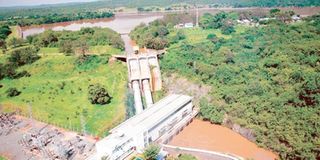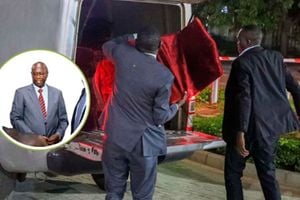Residents demand more from Seven Forks dams

The Kindaruma hydro power station in Embu county is one of the Seven Forks dams that produce most of Kenya’s electricity. Photo/FILE
Embu is the home of the dams that saddle the Tana river and provide the bulk of the electricity used in Kenya.
Electricity has generated wealth to manufacturers and shareholders alike; both to Kenya KenGen and to Kenya Power.
But the people around the dams in Mbeere South have nothing to show for it.
But what they do have is a long list of complaints about KenGen...
Of how they were alienated from their ancestral land in the 1970s and 80s without compensation.
Of how they have been tossed from one government office to another over the years.
Of how for them the dams known as the Seven Forks have become a curse and have created poverty in the area.
Of how they have no running water in their homes.
Of how they have no electricity — in spite of it being generated just a stone’s throw from their homes.
Of how schools are few and far between.
And of how their roads are ruined while those serving the dams and maintained by the power company are smooth.
But the people who live near the dams are united on one thing now Kenya has a new constitution — never, ever again will they be taken for a ride.
Work starts in March
Now tension is again rising following plans by KenGen to build another dam in the area.
Work on the proposed Karura dam, expected to produce 90MW of power, is slated to start in March next year.
The successful completion and commissioning of the dam will increase the installed hydro-electric power capacity 834MW.
Preliminary studies have been finalised but the residents are so unhappy it might become impossible for KenGen to carry out the project.
“Our relationship with KenGen is very bad following what we have gone through in the past. And like in a marriage, the company may have to first mend the relationship with the local people before any work commences,” said area councillor Francis Njuki.
Councillor Njuki was part of a farmers’ group likely to be affected by the new dam that has formed to demand compensation.
Mbeere South is predominantly arid with people owning large tracts of land. The average for an individual is about 10 hectares. While some people till their land when the weather allows, others rent it out.
But even before the work can start, the people are already claiming KenGen has failed to respect their property.
They claim that during the feasibility study, people believed to be from KenGen trespassed on their land and destroyed their crops.
It was not until the company was sent a demand letter from a lawyer hired by the farmers that they agreed to pay compensation, said the chairman of the Karura-Kanthenge Farmers Self-Help Group, Mr Franklin Mbijjiwe.
And he claims that in spite of that, some of the amounts paid were ridiculous.
“Some of us got as little as Sh80 in a cheque yet the cost of clearing such a cheque is not less than Sh200, which tells us that this company, just like in the past, does not care,” he said.
A public relations firm, IMG Kenya, representing KenGen, acknowledged that a feasibility study had taken place but said people had been compensated for the destruction of their crops.
The company declined to give more details, choosing instead to answer some of the questions forwarded to them by e-mail.
Residents complain that they have not benefitted from the dams already in existence, which were taken over by KenGen.
Mr Njuki Ireri, aged 60 and the father of 20 children from two wives, said he was among 300 people uprooted from the 2,500 hectares owned by his clan without.
In 1986, they were given notice to move to make way for the water at the Kiambere dam — and were given a warning that if they refused to move they would be drowned when the water was released.
He reluctantly moved out and the water arrived a year later, submerging the clan land.
“To date I have never received a single cent. I had cows and goats as well as farming which my family and I relied on but after we were forced out. I depended on the livestock which I exhausted reducing me to a pauper that I am now,” he said.
Councillor Njuki, whose ward covers the power belt, said residents were not about to give up and have taken their case regarding the existing dams to the office of Chief Justice Willy Mutunga.
The area MP, the Rev Mutava Musyimi, took the diplomatic path, saying he was aware of the issues and that there had been several discussions involving all the parties.
“The same issues the people are raising have been there even with the previous dams but they have not been resolved. But we have a new country with a Constitution that recognises the sovereignty of the people and where they are listened to when they raise such issues,” he said.
This time round, residents said they would insist on becoming shareholders of KenGen, with their shares through the compensation they would otherwise be due.
That would give them a forum to vent their views, they believe, and they are also contemplating the possibility of leasing the land if the compensation is insufficient.
They want the buffer-zone around the dams reduced because it takes more land that lies idle.
They cite the example of Kiambere dam that has a buffer of 100 hectares which they say is used for farming and keeping livestock by KenGen employees.
KenGen should also keep its promise that the dams will revert to the multipurpose nature envisaged so that they can benefit through the provision of water for domestic use and irrigation.
Once building starts, residents say they want their sons and daughters to be given priority in jobs, especially for non-skilled labour.
They argue that the company should bring in only skilled labour that might not available locally.
They also want the roads improved and water points to be provided outside the cutlines, saying that at present they get water from the dams and are at risk from crocodiles.
Councillor Njuki commented: “What we want is an assurance we will benefit, unlike before when we were only given promises. We have had a very bad relationship with KenGen which they should first and foremost put right before work starts.”




